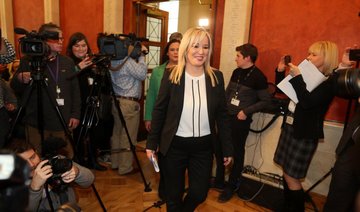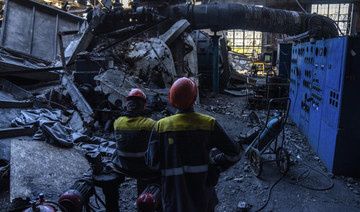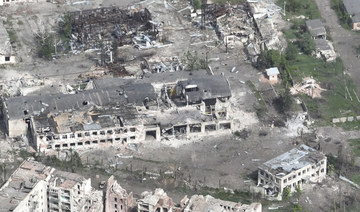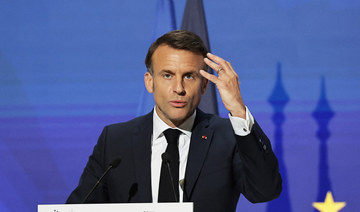LONDON: John Hume, the visionary politician who won a Nobel Peace Prize for fashioning the agreement that ended violence in his native Northern Ireland, has died at 83, his family said Monday.
The Catholic leader of the moderate Social Democratic and Labour Party, Hume was seen as the principal architect of Northern Ireland’s 1998 peace agreement. He shared the prize later that year with the Protestant leader of the Ulster Unionist Party, David Trimble, for their efforts to end the sectarian violence that plagued the region for three decades and left more than 3,500 people dead.
“I want to see Ireland as an example to men and women everywhere of what can be achieved by living for ideals, rather than fighting for them, and by viewing each and every person as worthy of respect and honor,” he said in 1998. “I want to see an Ireland of partnership, where we wage war on want and poverty, where we reach out to the marginalized and dispossessed, where we build together a future that can be as great as our dreams allow.”
Hume died Monday morning after suffering from ill health for several years, his family said.
Born on Jan. 18, 1937, in Northern Ireland’s second city — Londonderry to British Unionists, Derry to Irish nationalists — Hume trained for the priesthood before becoming a fixture on Northern Ireland’s political landscape. An advocate of nonviolence, he fought for equal rights in what was then a Protestant-ruled state, but he condemned the Irish Republican Army because of his certainty that no injustice was worth a human life.
Although he advocated for a united Ireland, Hume believed change could not come to Northern Ireland without the consent of its Protestant majority. He also realized that better relations needed to be forged between Northern Ireland and the Republic of Ireland and between London and Dublin.
He championed the notion of extending self-government to Northern Ireland with power divided among the groups forming it.
“Ireland is not a romantic dream; it is not a flag; it is 4.5 million people divided into two powerful traditions,″ he said. “The solution will be found not on the basis of victory for either, but on the basis of agreement and a partnership between both. The real division of Ireland is not a line drawn on the map, but in the minds and hearts of its people.”
While both Hume and Trimble credited the people of Northern Ireland and the Irish Republic for approving a referendum that led to power sharing, it was Hume’s diplomacy that offered the impetus to the peace process that led to the 1998 Good Friday accord.
Hume won the breakthrough in Belfast’s political landscape in 1993 by courting Gerry Adams, the head of Sinn Fein, the political wing of the Irish Republican Army, in hopes of securing an IRA cease-fire. That dialogue burnished Adams’ international credibility and led to two IRA cease-fires in 1994 and 1997.
Like most Protestant politicians at the time, Trimble had opposed efforts to share power with Catholics as something that would jeopardize Northern Ireland’s union with Britain. He at first refused to speak directly with Adams, insisting that IRA commanders needed to prove they were willing to abandon violence.
He ultimately relented and became pivotal in peacemaking efforts.
Hume had envisioned a broad agenda for the discussions, arguing they must be driven by close cooperation between the British and Irish governments. The process was overseen by neutral figures like US mediator George Mitchell, with the decisions overwhelmingly ratified by public referendums in both parts of Ireland.
“Without John Hume, there would not have been a peace process,” Mitchell said at the time the prize was announced. ”Without David Trimble, there would not have been a peace agreement.”
Hume and Trimble were said to have had a frosty relationship. But Trimble on Monday described a thawing after the Nobel ceremony in Oslo, recalling that the hotel at which they were staying had suggested the two men chose to relax away from each other.
“We didn’t do that. We relaxed and in some sense celebrated the occasion jointly, and that for me spelt out the principle for how we were going to proceed in the years after that,” he told the BBC.
Tributes poured in after’s Hume’s death was announced, including praise from Adams, who called him a “giant in Irish politics.” Former Prime Minister Tony Blair, who was in office at the time the accord was signed, lauded Hume’s “epic” contribution to the peace process.
Former US President Bill Clinton and former Secretary of State Hillary Clinton issued a statement describing their sadness.
“Through his faith in principled compromise, and his ability to see his adversaries as human beings, John helped forge the peace that has held to this day,” they said.
UK Prime Minister Boris Johnson said the Northern Ireland of today is Hume’s legacy.
“He stood proudly in the tradition that was totally opposed to violence and committed to pursuing his objectives by exclusively peaceful and democratic means,” Johnson said on Twitter. “His vision paved the way for the stability, positivity and dynamism of the Northern Ireland of today and his passing is a powerful reminder of how far Northern Ireland has come.”
Hume’s family said his funeral would be in keeping with strict guidelines on attendees because of the COVID-19 pandemic. A memorial will be arranged later.
“We are grateful for your condolences and support, and we appreciate that you will respect the family’s right to privacy at this time of great loss,” the family said in a statement. “It seems particularly apt for these strange and fearful days to remember the phrase that gave hope to John and so many of us through dark times: ‘We shall overcome.’”
John Hume, who worked to end N. Ireland violence, dies at 83
https://arab.news/vdj9x
John Hume, who worked to end N. Ireland violence, dies at 83

- Although he advocated for a united Ireland, Hume believed change could not come to Northern Ireland without the consent of its Protestant majority
- John Hume: I want to see Ireland as an example to men and women everywhere of what can be achieved by living for ideals, rather than fighting for them
Russia’s FSB says it killed saboteur recruited by Ukraine
he had entered Russia from Lithuania in March after receiving training there
MOSCOW: Russia’s FSB state security service said on Friday its officers had killed a saboteur who had been recruited by Ukraine and was planning to attack a fuel terminal in northwestern Russia with explosives.
The FSB said in a statement the man was a Russian national recruited by Ukraine’s military intelligence to carry out the attack in the Leningrad region, and that he had been killed after shooting at security agents.
The FSB said he had entered Russia from Lithuania in March after receiving training there.
Vilmantas Vitkauskas, Head of the Lithuanian National Crisis Management Center, denied the allegation.
“Russia has been systematically conducting disinformation campaigns and provocations for a long time in order to raise tensions among societies and allies and to cover its aggressive actions,” he said.
“This disinformation spread by the FSB is a case in point. One of the objectives of such aggressive activities is to influence Lithuania’s support for Ukraine.”
There was no immediate comment by Ukraine, were Russian forces are waging war after Moscow’s full-scale invasion in February 2022.
Russia’s FSB state security service said on Friday its officers had killed a saboteur who had been recruited by Ukraine and was planning to attack a fuel terminal in northwestern Russia with explosives. (AFP/File)
Little hope of Ukraine breakthrough during Xi France visit: observers

- “France and the European Union expect him to use his influence on Russia, but Xi Jinping has nothing to offer on Ukraine,” said a former European diplomat
- Xi is due to make a state visit to France on Monday and Tuesday
PARIS: French President Emmanuel Macron will next week make a new push to try and dissuade China’s Xi Jinping from supporting Russian President Vladimir Putin’s war against Ukraine but is unlikely to make a breakthrough on ending the conflict during the visit, observers say.
President Xi’s visit is set to be rich on symbolism — with a sumptuous dinner at the Elysee Palace and a trip to the Pyrenees mountains planned — but risks being short on diplomatic success for the French leader.
“France and the European Union expect him to use his influence on Russia, but Xi Jinping has nothing to offer on Ukraine,” said a former European diplomat, asking not to be named.
Xi is due to make a state visit to France on Monday and Tuesday, followed by visits to Serbia and Hungary, two European countries retaining warm ties with Russia.
While Xi and Macron will discuss international crises, trade, climate change and cultural exchanges, the key aim will be to “point out that for Europe, the first issue with China is its position on Ukraine,” said a source close to the French government.
On a visit to China in 2023, Macron had already called on Xi to “bring Russia to its senses” over Ukraine and urged him not to deliver weapons to Moscow.
Little has changed, however. Xi will host Putin for talks in China later this month.
Macron, 46, indicated he had not given up on the idea of trying to get Xi, 70, on his side.
“It’s not in China’s interest today to have a Russia that destabilizes the international order,” the French president said in an interview with The Economist published on Thursday. “We need to work with China to build peace.”
European Commission President Ursula von der Leyen, who has urged Beijing to play a greater role in ending the Ukraine war, will join Macron and Xi for talks on Monday.
Macron has said he will ask the Chinese president to help him achieve that aim when he visits Paris, which is preparing to host the Olympic Games this summer.
There is a historic tradition that peace should reign during the Olympics — although the opening of the Games in Beijing in August 2008 did not halt Russia’s invasion of Georgia.
“On Ukraine, China has done nothing,” said Marc Julienne, director of the Center for Asian Studies at the French Institute of International Relations (IFRI).
In February 2023, China published a 12-point position paper on Ukraine, but it was rejected by Kyiv and its Western allies.
Beijing, which says it is a neutral party in the Ukraine conflict, has been criticized for refusing to condemn Moscow for its offensive.
The United States had accused China of helping Russia carry out its biggest militarization since Soviet times.
US officials say China has provided dual-use supplies that have let Russia regroup in the face of a long delay in US aid to Ukraine.
In April, US Secretary of State Antony Blinken said this included “machine tools, semiconductors, other dual-use items that have helped Russia rebuild the defense industrial base that sanctions and export controls had done so much to degrade.”
China has rejected the US claims as “groundless accusations.”
Macron, too, is expected to raise “concerns” about “the activity of certain Wuhan companies that could be directly involved in or contribute significantly to the Russian war effort,” according to a member of his team.
Beijing is a major supporter of the Russian economy.
China-Russia trade in 2023 reached a record $240 billion, according to customs data, overshooting a goal of $200 billion set by the neighbors.
Experts say Beijing is unlikely to renounce support for Moscow, which it sees as a priority partner in its opposition to the United States.
“Xi Jinping’s priority is the Global South,” said Emmanuel Lincot, a China expert at the Catholic University of Paris.
“There is a congruence in the Sino-Russian bilateral relationship, particularly in the desire to counter the West. Which is not to say that there is no rivalry.”
Human rights group begins legal action over UK’s Rwanda migrant policy

- The group said the government’s Safety of Rwanda policy document was inconsistent with the new law
LONDON: Human rights group Asylum Aid said on Friday it had launched a legal challenge to the British government’s policy of sending asylum seekers to Rwanda in the wake of a new law which seeks to pave the way for the scheme to be put into operation.
The group said the government’s Safety of Rwanda policy document, published on April 29, was inconsistent with the new law which was passed by parliament last month to override a ruling by the UK Supreme Court that the scheme was unlawful.
Britain sanctions Israeli groups, individuals for violence in West Bank

- The four individuals sanctioned were responsible for human rights abuses against Palestinian communities in the West Bank
LONDON: Britain on Friday imposed sanctions on two “extremist” groups and four individuals in Israel who it blamed for violence in the West Bank, its latest package of measures against Israeli settlers.
Britain’s Foreign Office named Hilltop Youth and Lehava as two groups which it said were known to have supported, incited and promoted violence against Palestinian communities in the West Bank.
The four individuals sanctioned were responsible for human rights abuses against these communities, the statement added.
Among them are Noam Federman, who has trained settler groups in committing violence and Elisha Yered, who has justified killing Palestinians on religious grounds.
Violence in the West Bank was already on the rise before Israel’s assault on Gaza, which was triggered by an Oct. 7 Hamas-led attack on southern Israel.
It has escalated since, with stepped-up Israeli military raids, settler violence and Palestinian street attacks.
British foreign minister David Cameron said extremist settlers were undermining security and stability and threatening the prospects for peace.
“The Israeli authorities must clamp down on those responsible. The UK will not hesitate to take further action if needed, including through further sanctions,” he said.
Those sanctioned will be subject to financial and travel restrictions. Britain previously imposed sanctions on four Israeli nationals in February.
Universities take steps to prevent pro-Palestinian protest disruptions of graduation ceremonies
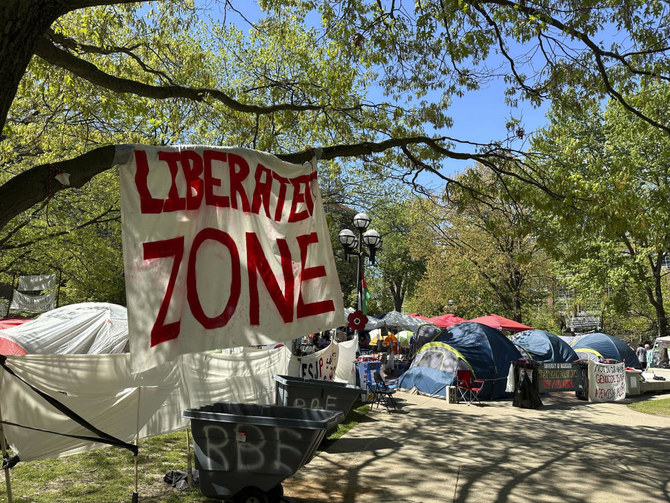
- Students booed and yelled “free Palestine” while the University of Utah president spoke Thursday night at commencement
- “People can exercise their First Amendment rights without disrupting or creating fear,” Burdick said of protesters
MICHIGAN, USA: With student protests over the Israel-Hamas war disrupting campuses nationwide, several major universities are intent on ensuring that commencement ceremonies — joyous milestones for graduates, their families and friends — go off without a hitch this weekend.
It won’t be easy. Colleges are hiring extra security, screening attendees at venues and emphasizing that significant disruptions by pro-Palestinian protesters won’t be tolerated. At the same time, they’re pledging to honor free-speech rights by designating protest zones.
Students booed and yelled “free Palestine” while the University of Utah president spoke Thursday night at commencement. He paused his speech to ask those who were protesting to leave or be removed. Outside the ceremony in Salt Lake City, a group of about 50 people were rallying. There was one arrest.
“Milestone is a perfect word,” said Ken Burdick of Tampa, Florida, describing his daughter’s graduation Saturday at the University of Michigan. He hopes the big day goes untarnished.
“People can exercise their First Amendment rights without disrupting or creating fear,” Burdick said of protesters.
Here’s how some schools are planning to balance things:
UNIVERSITY OF MICHIGAN
More than 8,000 graduates — and 63,000 spectators — are expected for Saturday’s festivities inside Michigan Stadium, known as The Big House. There will be security screening, and disruptive protesters could be subject to removal. Public safety officers and staff who commonly monitor major events, such as fall football games, will be present. Author and historian Brad Meltzer is the featured speaker.
In March, an annual event recognizing students with high academic achievement ended early when pro-Palestinian protesters raised provocative signs and drowned out remarks by President Santa Ono, yelling, “You are funding genocide!” The university subsequently drafted a policy that could lead to student expulsions and staff dismissals for event disruptions, though it hasn’t been finalized.
“It was painful for everyone who had gathered — and especially so for members of our Jewish community,” Ono said two days later.
Protesters have erected dozens of tents on the Diag, a historic space for campus activism more than a mile away from the stadium. They’re demanding that Michigan cut financial ties with companies connected to Israel. There has been no effort to break up the encampment and no arrests.
“We respect and uphold the principles of free expression, and also recognize that no one is entitled to disrupt university activities,” Laurie McCauley, Michigan’s chief academic officer, said in an email to students and staff about commencement.
Blake Richards, 25, is earning a bachelor’s degree in biochemistry. Richards plans to be at the football stadium Saturday after participating in a smaller ceremony Thursday for chemistry students.
“It could take away some great feelings, muddle them,” Richards said of any disruptions. “But truth be told, I’m not bothered. I know others have different opinions; I’m just happy to be here.”
INDIANA UNIVERSITY
The Bloomington, Indiana, campus is designating protest zones outside Skjodt Assembly Hall and Memorial Stadium, where ceremonies will be held Friday for graduate students and Saturday for undergraduates. Nearly 10,000 students are eligible to attend.
A social media post circulating on Instagram urged protesters to wear “your keffiyeh along with your cap and gown” and walk out during Saturday’s remarks by President Pamela Whitten.
Roughly 20 tents set up by protesters remained in place this week in an area known as Dunn Meadow, a mile from the stadium. Dozens of protesters have been arrested there recently, according to the Indiana Daily Student.
Maya Wasserman, a 22-year-old senior in management who is Jewish, said she and her family feel uncomfortable about the prospect of pro-Palestinian protests disrupting commencement. She expressed special concern for her mother and grandmother, who are Israeli.
“It’s unfortunate because we want this event to be about graduating, not politics,” Wasserman said.
At Dunn Meadow, students in lawn chairs or on blankets worked on their final assignments. Jessica Missey, a 20-year-old protester and senior, said she boycotted final exams; some professors, she said, simply canceled them. She has enjoyed the camaraderie at the encampment.
“Commencement is kind of just taking almost a little sidestep for me,” said Missey.
NORTHEASTERN UNIVERSITY
A week after police arrested nearly 100 protesters at Northeastern University, the school is holding its commencement exercises Sunday at Fenway Park, home of the Boston Red Sox, for the fourth consecutive year.
The venue will help security officials monitor the crowd and limit what people can bring. Signs, banners, balloons and full-size flags are prohibited in the stadium, along with most bags. Renata Nyul, vice president for communications, said public safety staffing will be strengthened.
All those entering Fenway will need to pass through metal detectors. About 50,000 graduates, family and friends are expected.
Northeastern is one of several universities in the Boston area that have had pro-Palestinian encampments. Some have let the protests continue, though Northeastern’s camp was broken up.
“While we realize that issues in the world prompt passionate viewpoints, the focus this weekend should be on our graduates and their remarkable achievements,” Nyul said.



